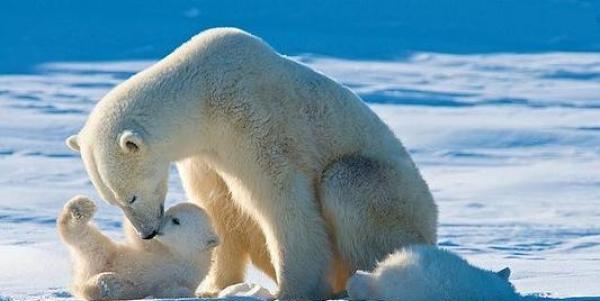The Paper's reporter Nan Boyi intern Wu Sifan

Recently, a study predicted that polar bears could become extinct by 2100 while greenhouse gas emissions remain high.
According to the British Broadcasting Corporation (BBC) reported on the 20th, a study by the non-profit organization Animal Protection Organization Polar Bears International predicts that unless humans take more measures to deal with climate change, polar bears will become extinct by the end of this century. Polar bears often rely on the sea ice of the Arctic Ocean to find seals for food, but unfortunately, as the sea ice melts, these polar bears are forced to swim long distances to forage or even come ashore, making it difficult for polar bears to find food to feed their cubs.
Sea ice forms and melts with the seasons in the Arctic, providing an important habitat for wildlife such as polar bears, seals and walruses. Since records began in the late 1970s, the area of Arctic sea ice has shrunk at a rate of about 13 percent per decade.
Currently, the International Union for Conservation of Nature (IUCN) has listed polar bears as extremely easy species to become extinct, and the researchers point out that climate change is a key factor in the decline in polar bear populations. Research suggests that shrinking sea ice areas triggered by climate change are likely to drastically reduce polar bear populations. By modeling the amount of heat used by polar bears, the researchers calculated their endurance limits, and some polar bear populations have reached their survival limits.
Steven Amstrup, a scientist involved in the study, told the BBC: "Our research has shown that, first of all, we will lose polar bear cubs because its mother did not have enough body fat to produce milk when the cub was born, so the cub could not survive the ice-free season. ”
"We all know that animals can only go a while without eating." He added, "This is a biological reality that all species must face."
At the same time, the BBC article notes that researchers can also predict when different parts of the Arctic will reach polar bear survival thresholds. The researchers warn that this phenomenon may have already occurred in some areas where polar bears live.
To this end, Amstrup called on the world to unite and take action: "The study shows that the imminent threat to different polar bear populations is yet another reminder that humanity must act now to avoid the most serious problems it may face in the future." ”
Editor-in-charge: Hu Zhenqing